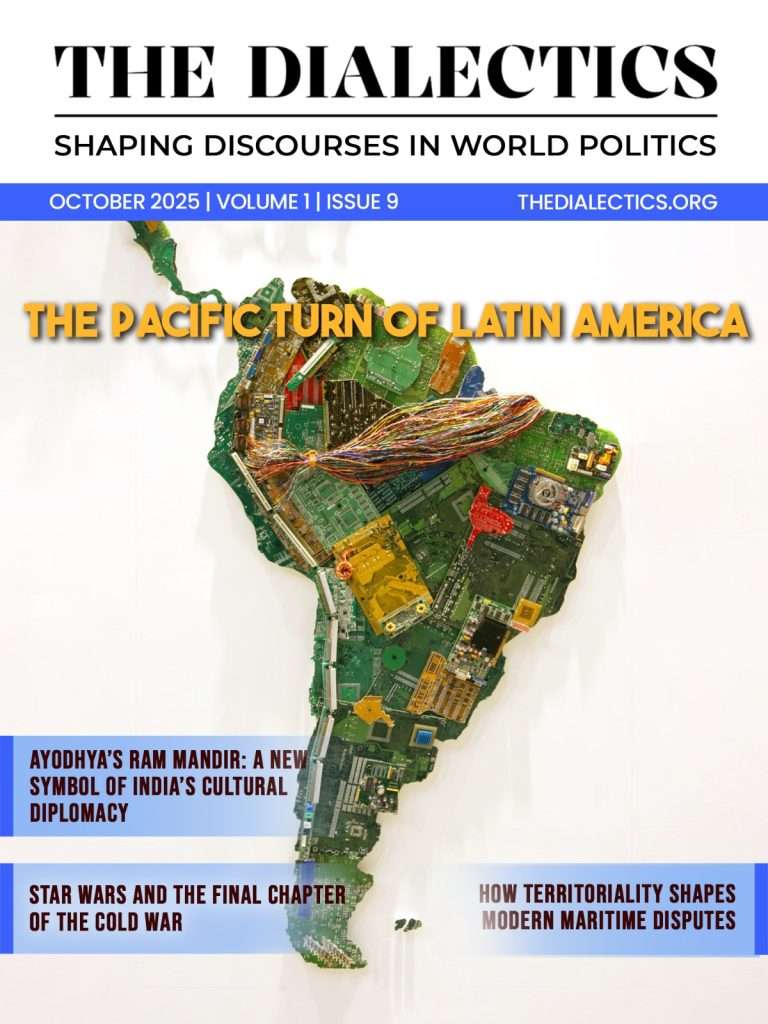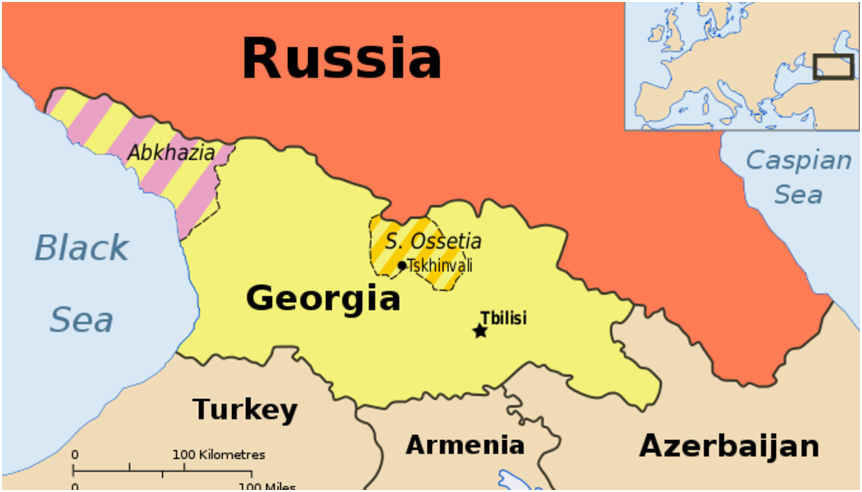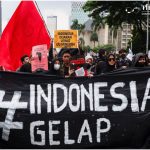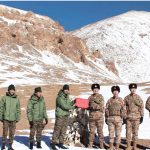Abkhazia, a small region located along the eastern seaboard of the Black Sea, brags a problematic and volatile past full of ethnic unrest, secessionist insurgencies, and great power conflict. The region and conflict have not grabbed much attention from International states the way the Palestinians or the Kurds did. This piece tries to bring all required knowledge -past and present, in order to give a complete understanding of the region. It examines the history of Abkhazia, the origins of its conflict with Georgia, the secessionist struggle for freedom, Russian interference, the effect of ethnic warfare on local politics, the outcome of the 2008 Russo-Georgian war, and the current Russian-supported elections within the country.
Let’s start our journey with some basic understanding of history.
Historical Background
Abkhazian history is long-standing in the intersection of various civilizations and empires. Abkhazia was under the influence of Greek, Roman, Byzantine, and Ottoman dominion historically prior to becoming part of the Russian Empire in the 19th century. During the Soviet era, Abkhazia became an autonomous republic within Georgia. Nonetheless, tensions boiled just below the surface as the Abkhazians desired more autonomy, while Georgian leadership sought to keep the area under their control. The dissolution of the Soviet Union in the early 1990s forced these tensions to the surface, paving the way for violent conflict.
Roots of Contention with Georgia
The conflict between Georgia and Abkhazia is the result of long-standing ethnic and political differences. During the Soviet period, Stalin’s actions gave overwhelming weight to Georgian dominance in Abkhazia, and this created resentment among the Abkhaz people, which felt that its culture and identity were being cornered. Soviet policies of forced assimilation and the imposition of ethnic Georgians in Abkhazia further fueled the conflict.
During the late 1980s, nationalist sentiment began to spread throughout the Soviet Union. Abkhazian leadership called for independence from Georgia, which was firmly resisted by the Georgian government. Things became even worse when Georgia unilaterally declared independence from the Soviet Union in 1991, and Abkhazia also wished to declare its independence. This conflict of interest created an armed conflict that would shape the destiny of the region.
Abkhazian Struggle for Independence
The collapse of the Soviet Union in 1991 accelerated Abkhazia’s drive for independence. Abkhaz leaders declared sovereignty in 1992, which led Georgia to deploy its military into the area. It resulted in a high-intensity war, and both sides took massive casualties.
The war was described by ethnic violence, with Abkhazian troops supported by Russia and North Caucasian volunteers fighting the Georgian army. Thousands of individuals, predominantly ethnic Georgians, had to leave their homes, and this created an enormous refugee situation that continues even today. In 1993, Abkhaz troops took control of most of the area, and a ceasefire was signed. Yet, the scars of war cut deep into the relationship between Georgia and Abkhazia, and the region was left in limbo, a de facto state that was not internationally recognized.
Russia’s Support for Abkhazian Separatists
Russia has played a pivotal role in Abkhazia’s separatist movement. Following the 1992-1993 conflict, Russia provided support to Abkhaliticalzian authorities, including economic aid, military assistance, and the issuance of Russian passports to Abkhaz residents. This backing was part of Russia’s broader strategy and global geopolitical game to maintain influence in the South Caucasus region and counter Western alliances such as NATO and the European Union.
Over the years, Russia has strengthened its military presence in Abkhazia, stationing troops and establishing military bases in the region. This has led to accusations that Abkhazia is becoming increasingly dependent on Russia, effectively turning into a Russian protectorate. While many Abkhazians appreciate Russia’s support in their struggle for independence, others worry about losing their autonomy to Moscow’s growing influence.
Ethnic Conflict and Regional Politics
The Abkhaz-Georgian ethnic conflict has had a deep impact on the politics of the region. The displacement of ethnic Georgians after the war considerably changed Abkhazia’s demography. The place turned it into a largely Abkhaz territory with a small, homogeneous minority. This change in population supported Abkhazia’s political authority over its land but further exacerbated its separation from the world.
Abkhazia’s political landscape continues to be unstable, with internal power struggles between local groups, economic issues, and the constant presence and support of Russia. The political leadership of the region is frequently split between those who push for greater integration with Russia and those who pursue a more independent course but still have relations with Moscow. These internal conflicts sometimes result in political instability and protests, further making governance in the region difficult.
Impact of the 2008 Russo-Georgian War
The 2008 Russo-Georgian conflict was a watershed for Abkhazia. The war had started when Georgia sought to reassert control over another breakaway province, South Ossetia. Russia intervened, launching a full-scale military campaign against Georgia. Abkhazian forces used the opportunity to drive the Georgian army out of the Kodori Gorge, the last Georgian enclave in Abkhazia.
After the war, Russia formally granted Abkhazia and South Ossetia statehood status, which Georgia and most of the international world decried. The declaration further intensified Moscow’s hold in Abkhazia, including growing military interaction and economic support from Moscow. Nonetheless, the international community, the United Nations, and the European Union persist in viewing Abkhazia as part of the sovereign nation of Georgia.
Recent Russian-Backed Elections
In March 2025, Abkhazia conducted presidential elections amidst political turmoil. Acting leader Badra Gunba won close to 55% of the vote, beating opposition leader Adgur Ardzinba. The election came after the removal of former president Aslan Bzhania during protests against an investment agreement with Russia that most Abkhazians feared would grant Moscow excessive influence over their economy.
The government of Georgia decried the election as illegitimate, reiterating Abkhazia is still part of Georgia. Russia, however, welcomed the results of the election, with President Vladimir Putin congratulating Gunba and reaffirming Moscow’s support for Abkhazia.
The vote was held in the midst of an electricity crisis in Abkhazia, fueled by low water levels at a major hydroelectric power plant and large-scale cryptocurrency mining operations that sapped power supplies. Abkhazians are annoyed by the failure to develop infrastructure and economic stagnation, while Russia continues to pour money into the territory.
Despite its dependency on Russia, there are those Abkhazians who are worried that it will become overly dependent on Moscow. Fears exist that Abkhazia’s sovereignty is threatened by an increasingly tightening stranglehold Russia has over the political and economic affairs of the region. However, there are few alternatives for Abkhazia except Russian backing without much international recognition and strained relations with Georgia.
Conclusion
The history of Abkhazia has been a search for identity and independence, guided by ethnic politics and geopolitical interests. This struggle for independence has resulted in conflicts, displacement, and political instability. Russian support has been central to Abkhazia’s de facto independence but, at the same time, has created tensions with Georgia and the international community at large. The recent elections highlight the intricate dynamics of local ambitions and foreign pressures that continue to influence Abkhazia’s way forward. As Abkhazia enters the future, its citizens are presented with tough decisions regarding their political and economic future. Whether or not the region will be able to sustain its fine balance between pursuing genuine independence and depending on Russia is yet to be seen. One thing, however, is certain: Abkhazia’s quest for recognition and stability is only just beginning.




